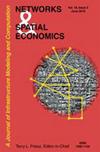Does Institutional Quality Matter for International Migrants in Their Home and Host Country? A Case of Russian Federation
IF 1.5
3区 工程技术
Q3 OPERATIONS RESEARCH & MANAGEMENT SCIENCE
引用次数: 0
Abstract
Poor institutions have been identified to hinder economic growth and development, with negative social and economic effects such as skilled human resource emigration. In a resource-rich economy, a poor institutional framework has been stated to be a key cause of resource curse. The current study used the CIS and other bordering countries to investigate the impact of both home and destination country institutional quality on migration flows to the Russian Federation. Is the Quality of Institutions (Origin and Host Countries) Important in Migration? The study demonstrated that institutional quality matters for migration from surrounding countries using a gravity-based model estimated using the Poisson Pseudo Maximum Likelihood (PPML). Population, unemployment, and GDP per capita were identified as push factors. In addition, the study discovered a correlation between the institutional quality of the host country and the inward migration flow. Therefore, the study recommends enhancing the institutional quality of the host country to increase the positive effects of inward migration flow制度质量对国际移民的母国和东道国重要吗?俄罗斯联邦案例
已查明贫穷的体制阻碍经济增长和发展,造成诸如熟练人力资源移徙等消极的社会和经济影响。在资源丰富的经济体中,不良的制度框架被认为是造成资源诅咒的主要原因。目前的研究利用独联体和其他边境国家来调查母国和目的地国的体制质量对流向俄罗斯联邦的移民的影响。移民制度的质量(原籍国和东道国)重要吗?该研究使用泊松伪极大似然(PPML)估计的基于重力的模型证明,制度质量对来自周边国家的移民很重要。人口、失业率和人均GDP被确定为推动因素。此外,研究还发现东道国的体制质量与向内移徙流动之间存在相关性。因此,该研究建议提高东道国的体制质量,以增加向内移民流动的积极影响
本文章由计算机程序翻译,如有差异,请以英文原文为准。
求助全文
约1分钟内获得全文
求助全文
来源期刊

Networks & Spatial Economics
社会科学-运筹学与管理科学
CiteScore
4.00
自引率
4.20%
发文量
26
审稿时长
>12 weeks
期刊介绍:
Networks and Spatial Economics (NETS) is devoted to the mathematical and numerical study of economic activities facilitated by human infrastructure, broadly defined to include technologies pertinent to information, telecommunications, the Internet, transportation, energy storage and transmission, and water resources. Because the spatial organization of infrastructure most generally takes the form of networks, the journal encourages submissions that employ a network perspective. However, non-network continuum models are also recognized as an important tradition that has provided great insight into spatial economic phenomena; consequently, the journal welcomes with equal enthusiasm submissions based on continuum models.
The journal welcomes the full spectrum of high quality work in networks and spatial economics including theoretical studies, case studies and algorithmic investigations, as well as manuscripts that combine these aspects. Although not devoted exclusively to theoretical studies, the journal is "theory-friendly". That is, well thought out theoretical analyses of important network and spatial economic problems will be considered without bias even if they do not include case studies or numerical examples.
 求助内容:
求助内容: 应助结果提醒方式:
应助结果提醒方式:


